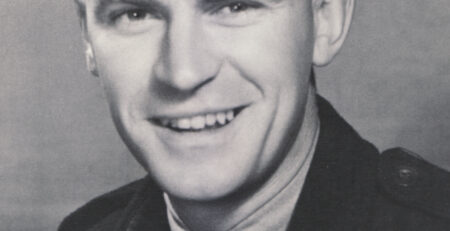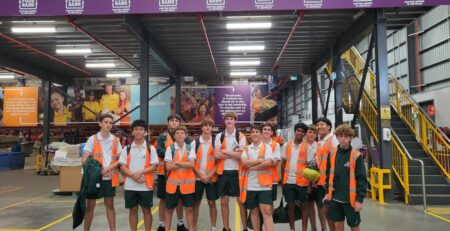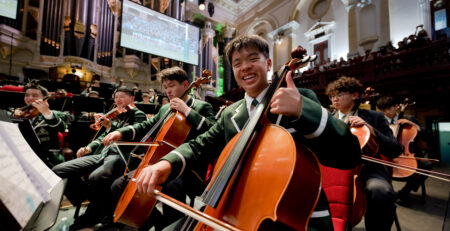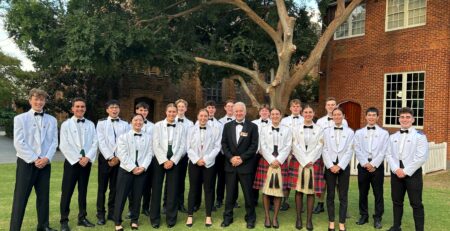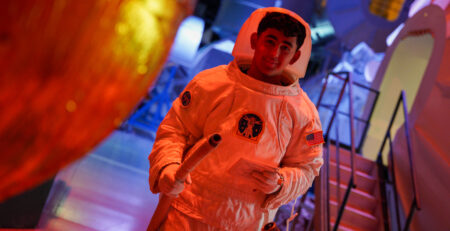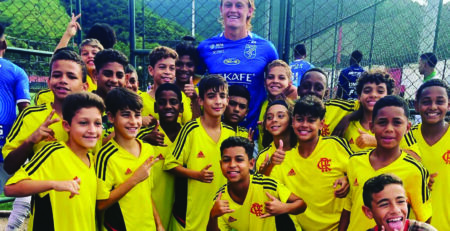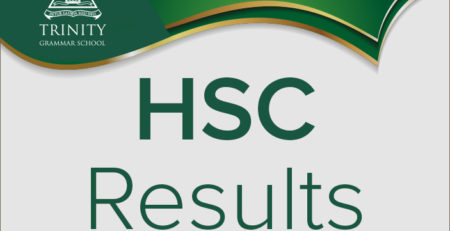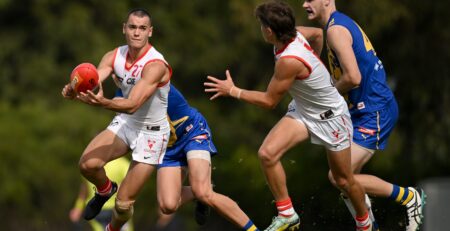Debating – CAS Round 2
7B DEBATING REPORT
On 30 July, the CAS 7B team debated against a strong Barker team on the topic that ‘Performance enhancing drugs should be used in professional sports’. After a very close debate we were successful. The affirmative team (Barker) argued that allowing all professional athletes to use performance enhancing drugs would create an entertaining atmosphere for spectators and allow athletes to reach their full potential. As the negative team, we argued that if athletes use performance enhancing drugs, this makes sport unfair and unsafe due to the health consequences of these drugs and defeats the ‘ethos’ of what sport represents, namely honesty, sportsmanship and fairness. Congratulations to Aakash V. (7Ta), Hugo N. (7WJ), Gregory K. (7La) and Ashton Y. (7Ta) who worked together to secure this win.
Ashton Y. (7Ta) and Gregory K. (7La)
10A DEBATING REPORT
This week was the second week of the CAS debating season, and now that the Trinity 10A team was familiar with the online format, we were ready for what was to come. We had a challenging debate against Barker College, a team that has been particularly strong in previous seasons. Our topic was “That all sports clubs should be owned by the local communities they represent,” and we were negative.
Barker’s case consisted of a model which would ban external ownership of all sports clubs in Australia. Their main points were that local ownership is the only way to ensure the clubs both represent their local community as well as financially support them. Trinity’s first speaker Christopher K. (10La) was quick to point out several questions left unanswered by the opposition’s model and a plethora of impracticalities that would arise from it. With the help of fellow Business Studies student, William T. (10WH), Christopher talked about the concept of Corporate Social Responsibility and how this ensures that sports clubs will support their community but only when they have the funds they need to do so, which the opposition’s model removes. Christopher argued that external ownership allows for more funding which increases community engagement. He also argued that external ownership brings valuable insight and perspective to sports clubs. This was a great start to our case which set the stage for our second speaker.
Trinity’s second speaker William T. (10WH) opened his speech with a terrific analogy of a money-eating rat which demonstrated how it is neither feasible nor practical to transition a privately run company to a public one. He then successfully identified many inconsistencies and impracticalities in the opposition’s model that had emerged during their second speaker’s speech. William then refuted their claims that sports clubs will make enough revenue from sponsorships alone to survive. His points examined several knock-on effects the opposition’s proposed transition would have on the local economy. They also explored how external ownership equalises inequalities that strictly locally owned clubs would have because of the unequal wealth distribution in Australia.
I, as the third speaker, examined the main clashes in this debate which were the impracticalities in the opposition’s model: economic viability and community engagement.
Our team advisor, Vivek S. (10WH) provided some excellent insight and encouragement during this debate, also using metaphors to explain gaps in the opposition’s model. This without doubt assisted all our speakers with their arguments and rebuttals. Overall, the 10As were able to win this debate thanks mainly to the hard work our speakers put into identifying the impracticalities, gaps, and inconsistencies in the opposition’s model.
I would like to thank the adjudicators and staff for making this season of CAS debating possible despite the ongoing hurdles this pandemic keeps throwing at us. I would also like to wish all the debating teams good luck in their future debates.
Alexander J. (10Fo)
FIRST III DEBATING REPORT
On the evening of Friday 30 July, the Trinity Debating Society continued our 2021 CAS Season with a much-anticipated round against Barker College. Having spent much of the previous seven days spectating the Tokyo Olympic Games, our debaters were secretly hoping for some sport-related topics, and we were certainly not disappointed, with the evening’s topics spanning the contentious issues of performance-enhancing drugs, athlete misconduct, and private ownership of sporting clubs. Trinity’s debaters thus entered preparation time invigorated, and eager to do our best to earn some ‘gold medals’ of our own. For the 1st III specifically, we were tasked with negating the topic ‘That all sports clubs should be owned by the local communities that they represent’, which was always going to be a challenge especially against the strong Barker team who were coming off the back of a very successful ISDA Season performance. This was clear from the first speaker of the affirmative, who established a clear case in favour of local ownership of sporting clubs, arguing that nobody knows a club better than the fans themselves, and that money-driven private owners are incapable of acting in the interests of a club, using the controversial example of the ‘European Super League’ as evidence. At first response, Will M. (12WH) began to break down this case, highlighting the distinct lack of business expertise of sport fans, and the incentive and ability of private owners to receive input from their fans whilst still making key decisions themselves. In his substantive case, Will also emphasised the investment that private owners can bring to clubs as a reason in support of private ownership. After the second affirmative speaker hit back at these points, Keith K. (12WH) bravely defended our characterisation of private owners and highlighted how fans would likely make decisions only in the short-term (rather than long-term) interests of the club. Keith also expertly applied his IB Economics knowledge to demonstrate how local communities would likely be unable to financially sustain large sporting clubs, and how private ownership would improve efficiency in sporting clubs. As always, our team is heavily indebted to Mr Ikeuchi for passing onto us his depth of expertise in the field of economics. Then, after a very persuasive speech from the affirmative third speaker, our captain Joshua P. (12La) completed the ‘anchor leg’ for the team by summarising the contentious issues and concerns of the debate, which were centred around the stakeholders of communities and sporting clubs. The quality of this speech led to what felt like a ‘photo finish’ where the two teams could barely be split. In the end though, the team from Barker came out on top, and the Trinity 1st III had to settle for a ‘silver medal’ on the night. Nonetheless, the debate proved invaluable for our team, and we have learned a few key lessons which we will look to apply in our debate next week against Waverley. Special thanks must be awarded to Daksh C. (12He), who served as reserve, fourth speaker, and moral support on the night, to our coach Paul, for his detailed feedback and teachings, and to Mr Taplin, who ensured the evening ran as smoothly as it did.
Will M. | Vice-Captain of Debating
DEBATER OF THE ROUND
Congratulations to G. Kariatlis (7La) for his outstanding thematic rebuttal, persuasive rhetoric and rigorous analysis of performance enhancing drugs undermining the integrity of sport. His arguments made a compelling case that helped the 7B team secure victory against Barker College.
Mr Chris Taplin | MIC of Debating


